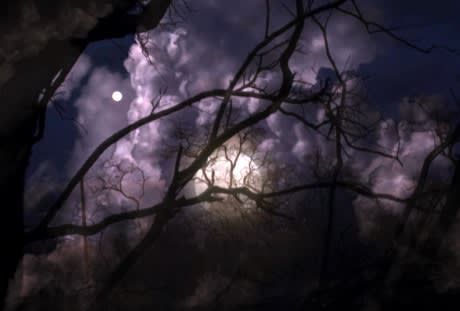Regardless of the subject Peter Mettler has selected to preach about, his documentaries have a unique, experimental, beautiful form, featuring stunning cinematography and visual juxtapositions, capturing aspects of the natural industrial world few would observe or consider. He defies the format, embracing the impressionistic and experiential in challenging the perception and engagement of the viewer, which, in the modern context of interchangeable, talking head, issue documentaries, is of utmost importance and relevance. His latest work, The End of Time, is no exception, tackling the cumbersome topic of time and its influence on the populous via varying ideological structures. Being a rather expansive topic, Mettler divides his work into broad segments, whether scientific, religious or philosophical, and extrapolates briefly, letting his visual handiwork generate a feeling while allowing viewers to reflect on the nature of the content they're absorbing. It starts, quite literally, with the beginning of time, as produced by the Big Bang. Explanations of existence on a cellular level are juxtaposed with graphic mock-ups of how such events might have looked on an extreme microscopic scale. Without delving too deep into these concepts, satisfied with a superficial look, he moves into the nature of the Earth and life itself, detailing interviews with well-intentioned, idealistic potheads that expand upon time as an ever-fluctuating construct of perception, something that can be exaggerated by the introduction of an aggressive species into an ecosystem unable to sustain them. The paralleling of this idea to that of the human race isn't particularly subtle, but the lush photography of natural environments and, eventually, lava is astounding to behold. More amusingly, some Eastern philosophy pops up, criticizing the Western construct of time while asserting the importance of living in the moment — something that would result in a quick dash of fornicating, killing and civilization imploding almost immediately — glibly stating that time doesn't exist. And, indeed, perception is the constant trajectory of The End of Time, which is of no surprise considering Mettler's very aggressive application of this in Petropolis. This is an astute and even apt approach to take to this lexicon of information but, as usual, his tactics are more pretentious than helpful or thoughtful. Had the visuals spoken for themselves, the audience could have interpreted their association with time in a mentally stimulating, emotionally riveting capacity. But Mettler continually interjects cheesy undergraduate prose and sanctimonious judgment, suggesting substitution of time for money is the sort of aggressive force that hastens mortality. Whether right, wrong or neither, it's the sort of smug naivety that doesn't help anyone other than the person propping up the assertion as an arbitrary mode of superiority. This tenuous look at an abundance of different motivations and discernments may initially inspire thought but the eventual devolving of global images into psychedelic, hypnotic visualizations affirms the superficial posturing. Amidst the spectacle, there is an overriding, foreboding feeling that this is just the vanity work of someone using stylization to mask their limited "perspective" on broad, introductory philosophical musings contemplated under the influence of weed. There's a commentary track included with the DVD that does little to dispute this observation.
(Mongrel Media)The End of Time
Peter Mettler

BY Robert BellPublished Apr 19, 2013